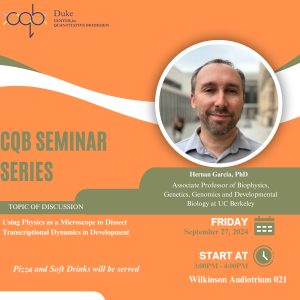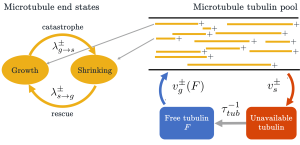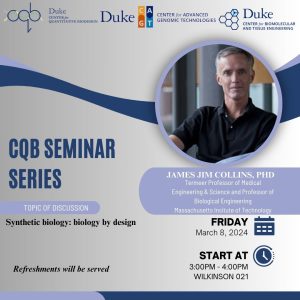
Join the CQB on Friday, September 27, 2024 from 3-4pm in Wilkinson 021, as we kick off our fall 2024 semester with our first guest speaker, Dr. Hernan Garcia, Associate Professor in the Departments of Molecular & Cell Biology and Physics at University of California, Berkeley.
Bio: Hernan G. Garcia is an Associate Professor in the Departments of Molecular & Cell Biology and of Physics at UC Berkeley. As a Physical Biologist, his research aims to uncover the quantitative and predictive principles dictating biological phenomena, with particular emphasis on embryonic development. Hernan is a co-author of the textbook Physical Biology of the Celland has directed several courses at institutions such as the Kavli Institute for Theoretial Physics at UC Santa Barbara, and the Marine Biological Laboratory in Woods Hole, MA.
Abstract: Over the last few decades we have largely identified the repressors and activators that shape gene expression patterns in developing embryos and that, in turn, dictate cellular fates. Yet, despite amassing this great reservoir of knowledge, we are still incapable of predicting how the number, placement and affinity of binding sites for these transcription factors in regulatory DNA dictate gene expression patterns in space and time. Achieving such predictive understanding calls for going beyond molecular parts lists and for obtaining the in vivo biochemical information necessary for fueling theoretical models of transcriptional regulation in developing animals.
In this talk, I will show how we are using physics as a “microscope” to uncover the molecular mechanisms by which activators and repressors dictate transcription in space and time in developing animals. Specifically, using novel quantitative tools that we have developed for precision measurements, I will show that most developmental genes are transcribed in stochastic bursts, and that many transcription factors regulate gene expression by modulating the frequency, duration, and/or amplitude of these bursts. We will then engage in an iterative dialogue between theoretical models and quantitative experiments aimed at revealing the mechanisms underlying this control of transcriptional bursting. Our results challenge the textbook picture of activator and repressor action based on stable protein-protein interactions and call for a description of transcriptional control that acknowledges that the nucleus is not a bag of well-mixed transcription factors. Most importantly, our work sets a path forward for reaching a predictive understanding of cellular decision making and demonstrates how a quantitative dialogue between theory and experiment can shed light on biological mechanisms beyond the reach of even the best super resolution microscopes.







